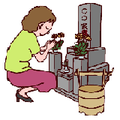春分 の 日 ( しゅんぶん の ひ ) 2012 年 3 月 20 日 火曜日
しゅんぶん||ひ||||とし|つき|ひ|かようび
vernal equinox|||spring equinox||||||
Vernal Equinox Day Tuesday, March 20, 2012
今日 は 、 春分 の 日 です 。
きょう||しゅんぶん||ひ|
春分 の 日 に は 、 昼 の 長 さ と 夜 の 長 さ が ほぼ 等しく なり ます 。
しゅんぶん||ひ|||ひる||ちょう|||よ||ちょう||||ひとしく||
|||||day||||||||||almost|equally||
On the vernal day, the length of the day and the length of the night are almost equal.
Le jour du printemps, la durée du jour et la durée de la nuit sont presque égales.
こういう 日 は 、 一 年 に 二 度 あって 、 それぞれ 、「 春分 の 日 」「 秋分 の 日 」 と 呼ば れ ます 。
|ひ||ひと|とし||ふた|たび|||しゅんぶん||ひ|しゅうぶん||ひ||よば||
this|||||||||each||||autumnal equinox||||called||
Such days are twice a year, and they are called "Spring Equinox Day" and "Autumn Equinox Day", respectively.
Ces jours sont deux fois par an, et ils sont appelés "Spring Equinox Day" et "Autumn Equinox Day", respectivement.
春分 の 日 と 秋分 の 日 は 国民 の 祝日 です 。
しゅんぶん||ひ||しゅうぶん||ひ||こくみん||しゅくじつ|
Le jour de l'équinoxe du printemps et le jour de l'équinoxe d'automne sont les jours fériés des citoyens.
多く の 企業 や 学校 は お 休み に なり ます 。
おおく||きぎょう||がっこう|||やすみ|||
De nombreuses entreprises et écoles seront fermées.
仏教 で は 、 昼 と 夜 の 長 さ が 同じに なる 期間 を 「 彼岸 」 と 呼び 、 先祖 の 霊 が 現生 に 戻って くる と 考え ます 。
ぶっきょう|||ひる||よ||ちょう|||どうじに||きかん||ひがん||よび|せんぞ||れい||げんなま||もどって|||かんがえ|
In Buddhism, we call the period in which the length of day and night is the same as "Higan", I think that the ancestral spirit will come back to life.
Dans le bouddhisme, nous appelons la période où la longueur du jour et de la nuit est la même que "Higan", je pense que l'esprit ancestral reviendra à la vie.
お 寺 や 各 家庭 で は 先祖 の 霊 を 祀 る 特別な 法要 を 行い ます 。
|てら||かく|かてい|||せんぞ||れい||し||とくべつな|ほうよう||おこない|
Temple and each household will do a special legal requirement to worship the ancestral spirit.
Temple et chaque foyer feront une obligation légale spéciale d'adorer l'esprit ancestral.
私 の 家 で は 、 彼岸 の 期間 中 に 必ず 先祖 の お 墓参り を し ます 。
わたくし||いえ|||ひがん||きかん|なか||かならず|せんぞ|||はかまいり|||
I always visit my ancestral grave during the Higan shore in my house.
Je visite toujours ma tombe ancestrale pendant le rivage de Higan dans ma maison.
家族 みんな で お 墓 に 行って 、 お 墓 の 石 や その 周り を きれいに し 、 お 花 と 線香 を 供え ます 。
かぞく||||はか||おこなって||はか||いし|||まわり|||||か||せんこう||そなえ|
All my family go to the grave, clean the grave stone and its surroundings, and offer flowers and incense incense.
Toute ma famille va à la tombe, nettoie la pierre tombale et ses environs, et offre des fleurs et de l'encens.
ひとりひとり 墓石 に 水 を かけて 、 お 祈り を し ます 。
|はかいし||すい||||いのり|||
Mettez de l'eau sur la pierre tombale et priez pour chacun d'eux.
きょう は 、 しゅんぶん の ひ です 。
しゅんぶん の ひ に は 、 ひる の なが さ と よる の なが さ が ほぼ ひとしく なり ます 。
|||||||な が|||||な が||||||
こういう ひ は 、 いちねん に に ど あって 、 それぞれ 「 しゅんぶん の ひ 」「 しゅうぶん の ひ 」 と よば れ ます 。
しゅんぶん の ひ と しゅうぶん の ひ は こくみん の しゅくじつ です 。
おおく の きぎょう や がっこう は お やすみ に なり ます 。
ぶっきょう で は 、 ひる と よる の なが さ が おなじ に なる きかん を 「 ひがん 」 と よび 、 せんぞ の れい が げんせい に もどって くる と かんがえ ます 。
|||||||な が|||||||||||||||||||||
お てら や かく かてい で は せんぞ の れい を まつる とくべつ な ほうよう を おこない ます 。
わたし の いえ で は 、 ひがん の き かんちゅう に かならず せんぞ の お はかまいり を し ます 。
かぞく みんな で お はか に いって 、 お はか の いし や その まわり を きれいに し 、 お はな と せんこう を そなえ ます 。
ひとりひとり はかいし に み ず を かけて 、 お いのり を し ます 。

